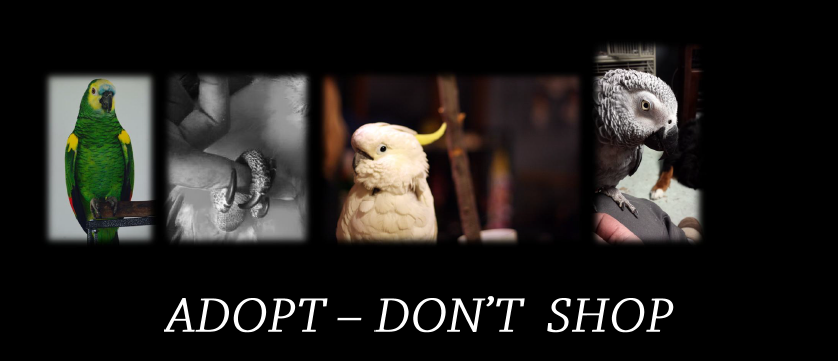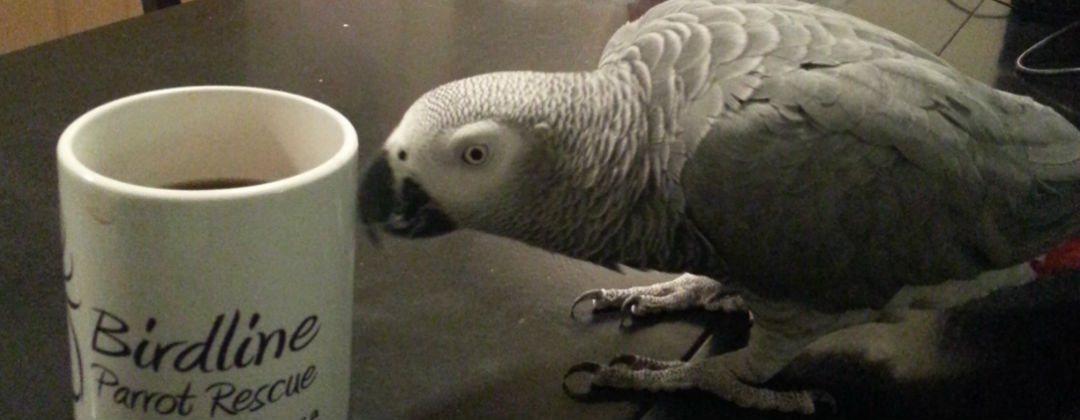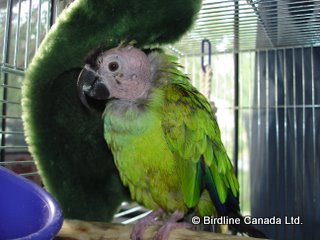So you think you want a parrot?
Have you ever heard someone say that they “want” a parrot because :
-
I want a parrot because they are quieter than other animals.
-
I want a parrot because they are not as messy as other animals.
-
I want a parrot because they can talk
-
I want a parrot because I want to teach my kids how to treat animals.
-
I want a parrot because they don’t bite.
-
I want a parrot because they don’t cost a lot of money to care for.
-
I want a parrot because they are really cool and can do tricks.
-
I want a parrot to breed with another one and than I can make a lot of money.
These are a few of the most common reasons that people get into parrot ownership – the list above is EXACTLY what most people find to be the opposite and ends up with the parrot being re-homed, abused or neglected or in a shelter so broken of trust and security and love, that it can and often times DOES take years for them to ever feel safe again.
Parrots are NOT quieter than other animals and if you have ever spent time with a cockatoo or a Macaw – you will see just how fast the myth is dispelled. Even the smaller conures can be incredibly loud and I have a known a few Quaker parrots that easily can make your ears ring.
Birds vocalize in the wild as a means of communication to others within their flock, they have been known to hear each other miles away in the forest. If they are ever separated from each other, their vocalizations are a way of communicating where they are and if they are ok – to alert others to predatory animals and even to signal that a source of food has been found– the same is said when these parrots live in our homes, they need to be able to vocalize with us (their flock) and too many times people try to “stop” or “cure” the screaming..would you try to stop a screaming baby with discipline? We can help to change the scream by returning some kind of vocalization with proper training but responding with disciplinary methods will only act as an enforcer to the behavior you wish to alter – you will never “stop” a bird from vocalizing, its part of what makes a bird..a bird.
Birds can be vocal for other reasons as well – birds are prey animals and if they feel they are in danger from another in the house or even a bird from outside they will give a distress call – an African Grey in our home when spotting a magpie out the window will hunker down on his play perch and start to growl – this growl will get louder and louder until the other bird leaves or he jumps off his perch in a panic to hide under the table.
At some time during the day, all parrots will vocalize – first thing in the morning and again in the evening as they would in the wild – all birds should be allowed this freedom to express themselves – your bird is simply happy to be alive!!
Birds also react to the general noise level in your house – loud kids/dogs/tvs/stereos/vacuums etc can cause parrots to make a lot of noise – lowering the noise level should calm the bird down.
As dusk approaches most birds will naturally quiet down and get ready to settle in for the night and most remain totally quiet when its dark – sadly – many people think that because this is when they are quiet, they will cover the cage – place them in a dark room or closet or even a garage to keep them quiet during the day..this may work but it is incredibly inhumane to lock away a bird for doing what comes naturally. The very health and mental well being of the parrot could be damaged beyond repair and cause a multitude of other behaviors to surface. A truly unethical treatment for a parrot and incredibly cruel.
Screaming at the bird does not work because they LOVE drama, they will see this as attention and continue to scream back at you, they see this as a reward to their behavior. This is when other “human” behaviors come into play when they cannot stop the screaming – people hit the cage with their hand or some other object – they throw things at the cage and some reach in and hit the bird or grab the bird and shake it..this is NOT seen as anything except cruel/inhumane treatment and abuse.
Birds coming into rescues/sanctuaries have most often times been subjected to this treatment and more – resulting in permanent physical and/or mental damage that is taking years…if ever to repair.
If you don’t like or can’t handle noise – don’t get a parrot.
Parrots are messy – more so than a cat/dog/gerbil and I am still unsure why others seem to think this – it truly is a misconception. If you were ever able to watch parrots in their natural habitats you would see first hand how incredibly messy/destructive they really are.
Food is more fun when tossed around and even better when they can see how far they can toss it “out” of their cages or off their play stands – the newspaper in the bottom of the cage is not only for droppings, but for their pleasure of ripping/shredding and again, tossing out the cage – this is a DAILY occurrence with parrots and needs to be cleaned…daily..and remember, not all poop stays IN the cage, some is ON the cage and some is shot OUT of the cage onto the wall/couch/chair/curtains or whatever is close by – the toys in their cages can also be a source of mess – the shreddable toys are the most fun for parrots and leave a huge mess to clean up – these messy toys NEED to be provided to the bird.
If mess is an issue and you don’t like cleaning – don’t get a parrot.
Not all parrots will talk – while some are known to have a better vocabulary than others, just because someone tells you that this species WILL talk does not mean that a particular bird will.
Unlike humans, parrots do not have vocal cords. Instead, they learn to control the movement of the muscles in the throat to direct the airflow in such a way as to reproduce certain tones and sounds—sometimes even human sounds. Parrots talk or form sounds by expelling air across their syrinx, a distended portion of the trachea.
Parrots can mimic and some can pick up every sound/phrase/sentence in your home – others choose to remain quiet and will simply make a few squawks once in a while but for the most part, remain silent – they may however be more vocal when you are not in the room – with that said however, a parrot having the ability to “talk” should not be the sole reason for adopting one.
If a talking bird is the main requirement you want – don’t get a parrot.
Parrots are not always best suited with children – while some species can tolerate the loud/sudden movements of smaller children, these same movements in an adult cockatoo or macaw can make them quite nervous and result in injury to the child.
Teaching your children about the care of a parrot or any animal can be done without having an animal actually participate in the teaching. The Internet and public libraries are full of books and information on the proper care required for ALL animals. SPCAs and various rescues/shelters are available to do talks/demonstrations – and if not – take your child to visit one and have a qualified member of the rescue/shelter talk to your child.
Before ANY animal is brought into a home – education/research should be done BEFORE bringing it home – a parrot is not a good choice – this is a wild animal – with wild instincts.
If you think a parrot is simply a “teaching” device – don’t get a parrot.
All Parrots bite – and its not a matter of “if” they will bite, but “when” they will bite.
A parrot’s beak is made of keratin, just like human fingernails. It has two basic parts the upper and lower mandible. The mandibles are hinged to the parrot’s skull which gives the upper and lower mandible separate vertical movement. Because their beaks grow continuously parrots need constant sources for chewing to help wear down their beaks and keep them in good condition. Cracking nuts is incredibly easy for them due to the extreme pressure they have and a favorite chair/table or window trim is incredibly easy for them to destroy.
Beaks are used to explore their surroundings and environment as well using their beak as a third foot to grasp/climb/step up and to hold nuts and toys.
Biting is one of the behavioral problems that people fear the most. Anyone who has ever been bitten by a larger parrot or even a smaller one, can fully understand the fears of being bitten.
One of the most common reasons birds bite is out of fear. A bird’s body language can give you clues to an impending bite. When parrots feel threatened they will react in a variety of ways, including running away, screaming, flailing their wings, hissing, growling, body posturing, and biting.
Some of the things that make parrots feel threatened or nervous are: invading their personal territory,. strangers (lack of trust), changes in their environment, disturbing them when they are at play or resting, unexpected noises, sudden movements, jealousy, negative reinforcement (which has become a habit), abuse, or neglect.
Another common reason that birds bite is protecting their mate. Your bird may feel that unfamiliar people, new birds, or new pets pose a threat to your safety. In these situations it is best to slowly introduce your bird to the new person, pet, or object, giving your pet enough time to accept and adjust to the change.
Lack of attention is also a cause for biting – a bird left alone for hours on end in their cage can easily become frustrated and resort to biting the caregiver.
Hormonal changes and molting may also cause biting in birds and its important to watch their body language for any signs of this – most times it will run its course but you need to be prepared – more articles on this will be available in more depth.
If you are afraid of being bitten – don’t get a parrot.
Parrots cost money – and most people are under the impression that they are a “cheap” and “easy” pet to care for not fully realizing the costs involved.
Good quality pellets/seed mixes/grains/organic fruit and vegetables are all expensive – in some parts of the country the produce is not as expensive but the general rule is about 20 – 40 dollars a “week” – if you have multiple birds, add more to the cost accordingly.
Not everyone is able to make their own toys so factor in the cost of good quality bird-safe toys – these are not a luxury item and NEED to be provided for your bird irregardless the species – they need to chew/play and have enrichment toys provided to them and just like a small child, they DO get bored easily so various toys should be made available for rotation in their cage/play stands and any other area they play in.
People often say that they don’t buy a lot of toys because they spend upwards of 40.00 on ONE toy only to have the bird destroy it within a few hours – that is “exactly” what they are supposed to do!!
Parrot ownership comes with responsibilities and one of them is veterinary care. Because this is a specialized field, Avian vets are not always so easy to find and some charge higher than average prices. With that said, avian medicine is a very specific field with specific tools/equipment/training etc etc and worth every penny for your feathered companion.
It is not unusual to go into the vet for a well bird vet examination which would include a full blood work up and possibly a DNA test and have the bill exceed 300.00. While this is not done on every visit, certain medical conditions are VERY costly to treat in parrots.
Vet visits should be done on a regular basis with your Avian Vet – no different than taking in a dog/cat for their yearly shots. When you break down the cost “monthly” you are going to average at minimum about 135.00 – add to this any additional purchases of toys/extra cages/emergency care and most parrot owners stipulate at least 3000.00 per year.
If you cannot adequately provide the “necessities” – don’t get a parrot.
Not all parrots can do tricks – nor do they want to – they should never be thought of as another “playtoy” in your home or something to keep your kids amused or keep your dog company while your at work.
This category falls into the “talking” category.
If amusement is the only reason to adopt – don’t get a parrot.
Breeding – is strongly discouraged and is NOT condoned or promoted by Birdline Canada and is a heated debate in the Avian world. Breeders claim to breed in order to sell “quality” chicks and will give numerous reasons why “they” are the most ethical breeder out there. We strongly believe that with the rescues throughout Canada and USA and every other country FULL to brimming with unwanted parrots, there is NO justification to actively ADD to the over population.
Humans took on the role of captive breeding of wild birds – the sole reason being the huge market in which to sell them – not many see that side of things and turn a blind eye to what parrots go through during this process.
If you want a bird to solely make money off of – DON’T GET A PARROT and be a contributor to the pain/suffering so many are subjected to.






An excellent text and so true.
Such good advice, that should be not only read, but studied by those considering to have a parrot join their home.